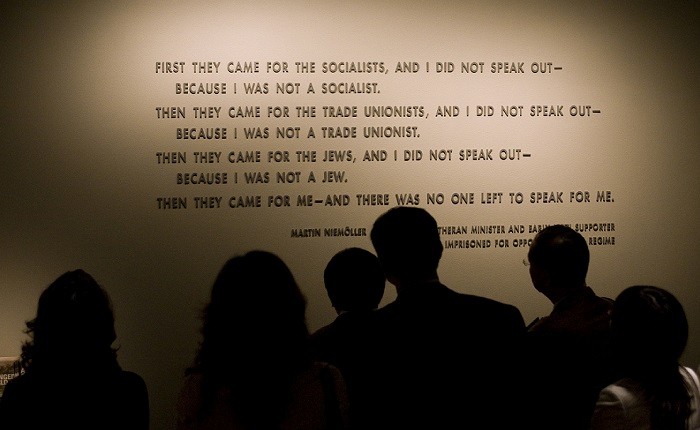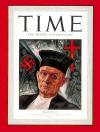Most of us have seen the following words, often on placards at protests. Some of us know that a man called Martin Niemoller spoke them:
First, they came for the socialists, and I did not speak out—
Because I was not a socialist.
Then they came for the trade unionists, and I did not speak out—
Because I was not a trade unionist.
Then they came for the Jews, and I did not speak out—
Because I was not a Jew.
Then they came for me—
and there was no one left to speak for me.
There’s a lot we may not know about Niemoller (1892-1984).
Niemoller was the son of a Lutheran pastor. He served in the German navy during World War I. By the end of that war, he was a submarine commander. When Germany lost that war, he refused an order from his superiors to surrender his submarine. Since he was a highly decorated officer, command was transferred to another officer so the navy could avoid issuing Niemoller with a dishonourable discharge for insubordination (EDITED, see note below).
Soon thereafter, he obtained theological training, then became a pastor in a Lutheran church in Dahlem, Berlin.
When Hitler rose into prominence, Niemoller was very pleased. He considered Hitler and the policies of his National Socialist (Nazi) Party good for Germany, and for the church in Germany. In 1924 and in 1933, he voted for Hitler and the Nazi party. By 1933, he was a national Christian leader.
Soon after Hitler came to power in 1933, he met privately with Niemoller and two others. At that meeting, Niemoller saw that Hitler was an evil, dangerous deceiver whose plan was to hijack the church and turn it into a servant of the state. From that time on, Niemoller began speaking and organizing against Hitler and the Nazi party.
Niemoller was one of the founders, together with Dietrich Bonhoeffer and others, of the Pastors Emergency League. This league became “the Confessing church.” In May 1943, from the city of Wupperthal, it issued the Barmen Declaration.
The Barmen Declaration proclaimed doctrines which were opposed to those of the “German Christians.” It accused the “German Christians” of amalgamating Christianity with nationalism, militarism and racial purity. It said the “German Christians” were adopting false doctrines to suit “prevailing ideological and political convictions.”
Niemoller was a vigorous promoter of the Barmen Declaration and the subsequent Dahlem declaration, which was issued after a conference of national leaders in his parish in Berlin in October 1934.
Niemoller spoke and preached tirelessly about true and false doctrine and the importance of resisting the intrusion of Hitler and the Nazi party into church affairs.
But he still supported many Nazi policies. One of the most jarring things about Niemoller is his request, while “Hitler’s personal prisoner” in a concentration camp, to serve in the German navy: the same Niemoller who, in a public statement in July 1936 – a year before his arrest – said:
… we must warn the Führer, that the adoration frequently bestowed on him is only due to God. Some years ago the Führer objected to having his picture placed on Protestant altars. Today his thoughts are used as a basis not only for political decisions but also for morality and law. He himself is surrounded with the dignity of a priest and even of an intermediary between God and man… We ask that liberty be given to our people to go their way in the future under the sign of the Cross of Christ, in order that our grandsons may not curse their elders on the ground that their elders left them a state on earth that closed to them the Kingdom of God.
Niemoller became famous within Germany and abroad. This was too much for Hitler. In 1937, Hitler personally ordered the arrest of Niemoller.
Niemoller then spent seven years in detention. First, in various lockups and prisons. Later, in concentration camps. Often in solitary confinement. His fate was tracked internationally. He was on the cover of Time Magazine on Christmas eve, 1944.
I am very struck by something Niemoller said after he was released.
He said that before he became a prisoner of the state, all his speeches were focused on answering the question “How to find a merciful God?” (Some may remember that this was also Luther’s question.)
But, after seeing the horrible things done by his countrymen during the war, he said he would dedicate the rest of his life to making speeches to answer the question “How to make my neighbour merciful?” And he did.
In other words, he committed himself to being an activist, focused on showing his neighbours a better way and persuading them to abandon their prior ways.
Niemoller’s faith and his time in detention led him to resolve that he must intentionally engage with others and hold his ground without causing undue offence – this is what he modelled in the rest of his life. He even became a pacifist!
Niemoller’s life shows me that people can and do change. That each one of us must change.
Niemoller’s life cries out to me: “You are responsible for your neighbour. Do not give up doing good and speaking truth. Be confessional. Be bold. Do not be discouraged.”
Niemoller’s life helps me see why and how governments co-opt faith groups and their leaders and what response God expects from members of faith communities.
What does Niemoller’s life show you?

Visitors stand in front of the quotation from Martin Niemöller that is on display in the Permanent Exhibition of the United States Holocaust Memorial Museum. Niemöller was a Lutheran minister and early Nazi supporter who was later imprisoned for opposing Hitler’s regime.
National Holocaust Museum, Washington DC (Image and caption)
Note: An earlier version incorrectly said “For this insubordination, he was discharged.”
To learn more about Rama, click here.



Pingback: At three o-clock I must die - Bangsar Lutheran Church
Pingback: A story of German migrants - Bangsar Lutheran Church
Reminds me of the Wilhelm II who tjought very favourably of Hitler and thinking that the growing prominence of the Nazi regime in the mid-late 1930s may result in restoration of the Prussian monarchy. Of course Niemoller is much more noble and selfless in his initial faith in Hitler.
I realised that the quote by Niemoller has also inadvertently coloured my perspectives, and that advocating for persons/groups with lesser voice, is both a Christian and Civic duty.